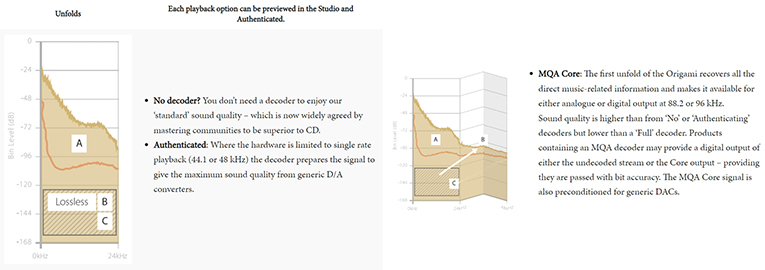This is a little deeper into the weeds than I normally wade, since it has to do with a fairly esoteric piece of technology and a bunch of companies who are trying to make money with it. However, said thing is interestingly controversial, and it definitely intersects with what we cover here at SoundStage! Solo.
I’m talking about MQA, aka Master Quality Authenticated, a way to deliver high-resolution audio using a relatively small amount of data. At least, that’s the pitch. Whether it ever delivered on that promise is up for debate.

MQA has been in the news twice this year. In April, MQA Limited, which owns the technology, went into administration, which is similar to bankruptcy. A few months later, MQA popped up in the news again, this time because the company’s assets had been bought by none other than Lenbrook Industries Limited, owners of such storied brands as NAD and PSB. An interesting development to be sure. But what does it all mean, and more importantly, should you care?
The Rise of MQA
Developed by Meridian Audio, MQA arrived in December 2014 to much fanfare. Meridian later spun MQA off as a separate company, MQA Limited.
As streaming audio gained in popularity, MQA seemed like a novel solution to keep data use down while keeping sound quality up. Meridian is certainly no stranger to high-resolution audio formats. It created MLP, or Meridian Lossless Packing, the standard lossless audio format for DVD-Audio discs. So the claims about MQA were certainly given the benefit of the doubt in the early stages.
To simplify a bit, there are two broad ways to compress audio: lossless compression, which allows for bit-perfect reconstruction of the original waveform, and lossy compression, which modifies the signal in some way. The result of the latter is typically a much smaller file size, but it’s different from the original recording. The difference could be so small as to be inaudible, or it could be extremely noticeable (think early poorly encoded MP3s).

Despite what many purists say, lossy encoding isn’t inherently a bad thing. If you were to stream CD-quality audio to your phone, you’d be using up more than half a gig of data every hour. Done well, lossy encoding can be near-indistinguishable from the original.
The problem is, lossy compression didn’t have the best track record back in 2014. The most famous lossy codec, MP3, has long been notorious for its significant degradation of sound quality. So the initial enthusiasm for MQA was understandable. Here was a high-end company with a high-quality solution: high-resolution audio for the streaming age.
The problem, or one of the problems, is that MQA was oversold. Proponents claimed that MQA was a lossless format. Rather quickly, people started questioning that claim.
This is oversimplifying a bit, but here is the gist of how MQA works. It compresses high-frequency audio and embeds that data in lower-frequency bands. Imagine you need to encode the numbers one to 100, but you only have space to store numbers one to 80. MQA would take 81 to 100 and compress them (for our oversimplified analogy, let’s say the resulting compression is just the number 19). It would then store “19” in the lower numbers (1, 2, 3, 19, 4, 5, etc.). Then, according to MQA, the decoder would “unfold” this embedded information during playback to reveal 81 to 100 just as it was originally. MQA applies several measures, including dithering, to make this work.
Theoretically, this isn’t a bad thing. It’s also not that different from how several other encoding formats work. Again, the problem was calling it “lossless.” There are only so many bits to work with, and it was hard to see how something wasn’t getting lost in this mathematical magic. Experts and audio nerds questioned how the original audio could be rebuilt exactly as recorded, especially considering the dithering. MQA did a lot of hand-waving and never fully explained.
The fall
While numerous outlets, including the SoundStage! Network, had serious questions about the validity of MQA’s claims, MQA itself was doing fine. Its biggest implementation was in Tidal’s HiFi Plus tier (and full disclosure, I was a Tidal subscriber for a while because I liked the interface more than other options). One of the biggest pushbacks against the lossless claims came from YouTuber GoldenSound, who uploaded his own music, plus some test signals, to Tidal to test MQA. The results were revealing, to say the least.

While it would be fun to say such in-depth testing and reporting was the death knell, MQA soldiered on. However, it’s safe to say it was at best stagnating. While there were some notable announcements of the inclusion of MQA into playback hardware, none of the other big streaming services signed on. For lossless and hi-rez music, Amazon, Apple, Deezer, and Qobuz all use the open FLAC format.
Behind the scenes, it’s now clear things weren’t going well, and in April MQA went into administration, looking for a new buyer as it restructured internally. Tidal, MQA’s biggest proponent, now offers FLAC-encoded music, as well as MQA, in its top tier.
The (maybe) rise
It was more than a little surprising when, at the end of September, Lenbrook acquired some of MQA’s assets, which consisted mainly of intellectual property and business relationships with MQA licensees. Lenbrook is well known for its engineering prowess, so bringing on something as controversial as MQA seemed extremely out of character.
Lenbrook hasn’t announced what it plans to do with MQA, but we can make a few guesses about the short term. One, the company has been using MQA in some of its products, so perhaps this is an attempt to use the technology for “free” in its products while making a little money from fees to other licensees. It may also see something in the underlying technology for use in its wireless products. There are lots of patents and tech involved behind the scenes that we never see on the consumer side. It’s also possible this purchase had nothing to do with the MQA codec at all. MQA Limited was working on MQair, also called SCL6, a codec that works over Bluetooth and Wi-Fi. Perhaps that alone was something Lenbrook wanted to use or to help fast-track something else it’s working on.

For now, we don’t know. It’s entirely possible Lenbrook will use the tech they want and let the MQA name disappear, since among certain audiophiles, MQA is tainted goods. Perhaps it will remain a line-item on fact sheets like DTS, generating a modicum of income for Lenbrook among the circles of audiophile companies that do think it’s worthwhile.
I find the story of MQA fascinating, from its storied pedigree, to its inglorious demise, to its unexpected rescue. I wouldn’t call it a redemption arc, at least not yet, but who knows where this wild story (for high-end audio anyway) will go next?
. . . Geoffrey Morrison






